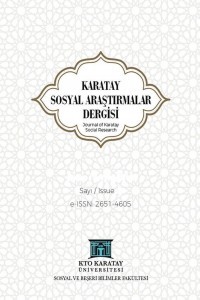COVID-19 PANDEMİSİ DÖNEMİNDE İİBF VE SBBF ÖĞRENCİLERİNİN UZAKTAN EĞİTİM HAKKINDAKİ DEĞERLENDİRMELERİ
Covid-19 Pandemisi, Uzaktan Eğitim, Üniversite Öğrencileri
Assessments of FBAS and FSHS Students About Distance Education During the Covid-19 Pandemic Period
Covid-19 Pandemic, Distance Education, University Students,
___
- Altuntaş Yılmaz, N. (2020). Yükseköğretim kurumlarında Covid-19 pandemisi sürecinde uygulanan uzaktan eğitim durumu hakkında öğrencilerin tutumlarının araştırılması: Fizyoterapi ve Rehabilitasyon bölümü örneği. NEÜ Sağlık Bilimleri Fakültesi Dergisi, 3 (1), 15-20.
- Cao vd. (2020). The psychological impact of the Covid-19 epidemic on college students in China. Psychiatry Research, (287), 15.
- İslamoğlu, H. ve Alnıaçık, Ü. (2014). Sosyal bilimlerde araştırma yöntemleri. İstanbul: Beta Basım Yayım Dağıtım.
- İşman, A. (2011). Uzaktan eğitim. Ankara: Pegem Akademi.
- Keskin, M. ve Özer Kaya, D. (2020). Covid-19 sürecinde öğrencilerin web tabanlı uzaktan eğitime yönelik geri bildirimlerinin değerlendirilmesi. İKÇÜSBFD, 5 (2), 59-67.
- Kürtüncü, M. ve Kurt, A. (2020). Covid-19 pandemisi döneminde hemşirelik öğrencilerinin uzaktan eğitim konusunda yaşadıkları sorunlar. Avrasya Sosyal ve Ekonomi Araştırmaları Dergisi, 7 (5), 66-77.
- MEB (2020.09.02). Uzaktan eğitime bir fikrim var. Erişim adresi: https://www.meb.gov.tr/uzaktan-egitime-bir-fikrim-var/haber/21488/tr erişim tarihi: 2020.09.08.
- Sahu, P. (2020). Closure of universities due to coronavirus disease 2019 (Covid-19): Impact on education and mental health of students and academic staff. Cureus, 12 (4), 1-5.
- Serçemeli, M. ve Kurnaz, E. (2020). Covid-19 pandemi döneminde öğrencilerin uzaktan muhasebe eğitimine yönelik bakış açıları üzerine bir araştırma. Uluslararası Sosyal Bilimler Akademik Araştırmalar Dergisi, 4 (1), 40-53.
- Toker Gökçe, A. (2008). Küreselleşme sürecinde uzaktan eğitim. Dumlupınar Üniversitesi Eğitim Fakültesi Dergisi, (11), 1-12.
- Uşun, S. (2006). Uzaktan eğitim. Ankara: Nobel Yayıncılık.
- Wang, C. vd. (2020). Risk management of Covid-19 by universities in China. Journal of Risk and Financial Management, 13 (2), 1-6.
- YÖK (2020.05.03). Uzaktan eğitim aylık durum tespiti. Erişim adresi: https://www.yok.gov.tr/Sayfalar/Haberler/2020/uzaktan-egitime-yonelik-degerlendirme.aspx, erişim tarihi: 2020.09.08.
- Yayın Aralığı: Yılda 2 Sayı
- Başlangıç: 2018
- Yayıncı: KTO Karatay Üniversitesi
TARİHÎ SÜREÇ İÇİNDE KONYA ŞEHRİNİN FİZİKİ GELİŞİMİ
Yusuf KÜÇÜKDAĞ, Caner ARABACI, M. Serhat YENİCE
COVID-19 PANDEMİ SÜRECİNDE AİLEDE RUH SAĞLIĞI
DOĞU-BATI ETKİLEŞİMİNDE ENDÜLÜS EMEVÎ DEVLETİ’NİN İDARİ YAPISININ GELİŞİM SÜRECİ
COVID-19 PANDEMİSİ DÖNEMİNDE İİBF VE SBBF ÖĞRENCİLERİNİN UZAKTAN EĞİTİM HAKKINDAKİ DEĞERLENDİRMELERİ
TÜRKİYE SELÇUKLULARI ZAMANINDA DENİZCİLİK FAALİYETLERİ VE DENİZ TİCARİ ANTLAŞMALARI
KÖYDEN ŞEHRE: KARABÜK’ÜN KURULUŞU VE ŞEHİRLEŞME SÜRECİ
CUMHURİYET DÖNEMİNE KADAR KARAMAN ŞEHİRSEL YAPISININ DEĞİŞİM VE DÖNÜŞÜM SÜRECİ
